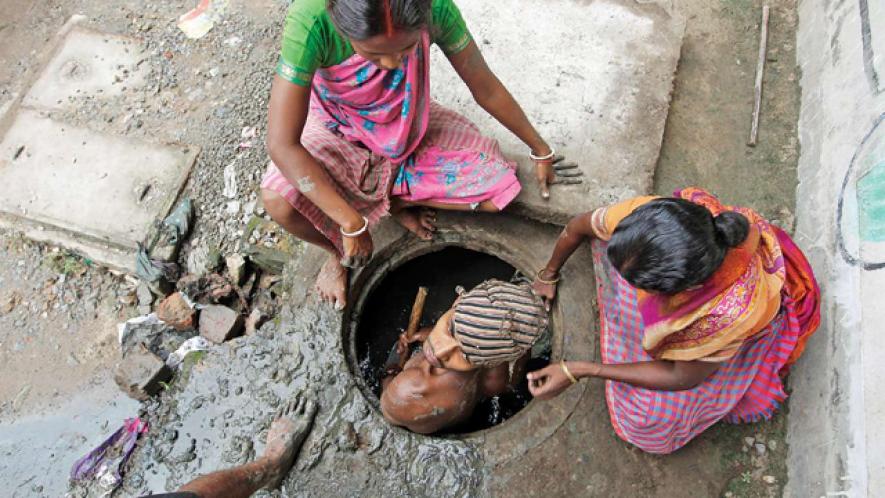In Denial, West Bengal Recorded Seven Deaths of Manual Scavengers in 5 Months

Representational Image. Image Courtesy: Reuters
The state of West Bengal has witnessed two major incidents of sewer deaths in the short interval of five months. On February 25, just prior to the assembly elections in the state, four sanitation workers suffocated to death in a manhole near Kudghat in Kolkata. While an abysmally low number of media outlets found the case worth reporting on, both the KEIIP (Kolkata Environmental Improvement Investment Program) and KMC (Kolkata Municipality Corporation) proceeded to accuse the other of the illicit employment of the workers without a single item of safety gear listed in the Prevention of Employment of Manual Scavengers and their Rehabilitation Act (PEMSR Act), 2013.
While the Kudghat incident is yet to produce an official inquiry report, another shocking incident happened on July 6 which claimed three young lives. The area where the incident took place comes under the Joypur Police Station in Howrah. Three migrants from Birbhum district were employed as construction workers for building a private lodge. Building the septic tank was a part of the construction plan; it was conducted without any supervision, prior training, or safety measures. The septic tank was confirmed to contain poisonous gas by Goutam Roy, the officer in-charge of the Fire Brigade. One could barely come across a detailed news report covering the whole incident 48 hours later.
Nationwide Concern
An inter-ministerial task force report had said that more than 53 thousand people engaged in the occupation of manual scavenging. The report was followed by a pilot survey carried out in only 121 districts across 18 states.
The PEMSR Act, 2013, mentions that the employer who engages workers to clean sewers or septic tanks needs to provide protective gear, else face penal consequences. However, activists from the Rashtriya Garima Abhiyan and the Safai Karamchari Andolan led by Bezwada Wilson repeatedly argue the use of the 43 protective gears; these are largely unheard of by manual scavengers across India. Notwithstanding the international unease caused by the practice of manually cleaning human excreta and other bio-chemical wastes, 11 states, including Bengal, denied participating in the nationwide survey conducted by the National Safai Karamchari Finance and Development Corporation in 2017 to register the number of people engaged in sanitation work.
Bengal: A Critical Case
West Bengal has been obfuscating facts about manual scavenging. For eight long years between the 2011 Census and 2019, the state government continued reporting the number of manual scavengers as zero. The government managed to sidestep the use of the PEMSR Act and its related initiatives by denying information. Significantly, the refusal of the state to conduct the survey for the registration of manual scavengers only brings up awkward questions about the “subaltern” CM and the overall political outlook of the state’s ruling party.
Dalit Muslims are predominantly engaged in the occupation of manual scavenging in Bengal. The “sociology of absences” systematically represses the particular experience of the Muslims, converted from untouchable Hindu sub-castes, and gradually normalises this organized silence. Bengal observes no exception; all the workers who died in both the successive incidences discussed in the article are Muslims from Dalit populated districts of Malda and Birbhum respectively. The influence of caste on the division of labor among the Muslim community is more complex. It cannot be traced to any religious sanctity, nevertheless making a difference in the lived reality. Additionally, the prolonged delay of a fruitful resolution to the issue of rising unemployment in Bengal and financial scams down to the Panchayat level further jeopardised the status of the marginalised people of the state.
Anti-BJP Electoral Consensus in Bengal and Caste
Bengal’s polity has allegedly had staunch refutation to the existence of caste during the Left rule. Instances of attempts to resolve caste-based atrocities by class questions are registered both by Left academia and general political breathing rooms. While the past decade showed up an identity-oriented electoral representation focusing on community vote banks, the last assembly election crafted a nationwide depiction of All India Trinamool Congress as a new alternative to the RSS-BJP's Hindutva and its sponsored onslaught upon the Muslim and Dalit communities in particular.
TMC supremo Mamta Bannerjee, despite her recurring pro-Hindu/Brahmanical statements from public platforms, successfully clinched a sweeping majority for the third time. In contrast to this stands the consecutive sewer deaths of Dalit/Dalit Muslims, the continued eschewing approach of the government to the concerning matter of manual scavenging, and the exponentially growing atrocities on Muslim/Dalit/Adivasi people of Bengal, living migrant/informal workers, farmers and most importantly the women from these communities.
There have been allegations of acute favoritism in implementing welfare schemes and of financial scams by bottom-rung TMC leaders. What would make Mamata Banerjee an exception then? Is there any response to the ceaseless calls from the manual scavengers, more significantly the front-line warriors of the COVID-19 pandemic, aside from extending schemes like “Didi ke bolo” (Ask help from Didi) given that the polls are over?
The writer is a PhD scholar at Jadavpur University. The views are personal.
Get the latest reports & analysis with people's perspective on Protests, movements & deep analytical videos, discussions of the current affairs in your Telegram app. Subscribe to NewsClick's Telegram channel & get Real-Time updates on stories, as they get published on our website.
























